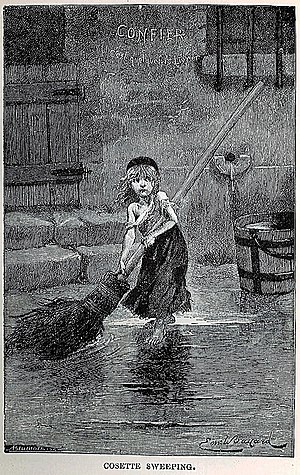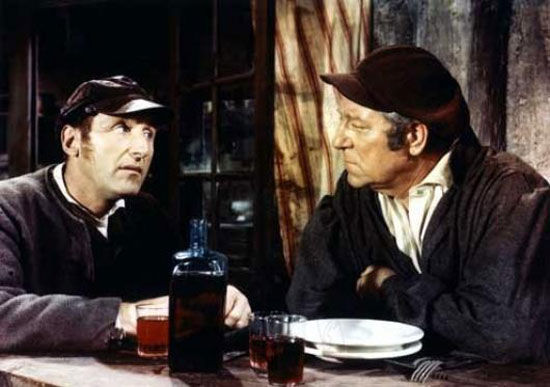 Image via WikipediaA few days ago I finished reading "Les Miserables". Finally! Or I should say, I finished reading "Jean Valjean", because I jumped so many passages even the whole chapter of "Waterloo". I blamed my poor English reading skill for feeling difficulty in reading all pages of this book. However after I read instruction of the book I realized the digressions of this book seems to be an issue.
Image via WikipediaA few days ago I finished reading "Les Miserables". Finally! Or I should say, I finished reading "Jean Valjean", because I jumped so many passages even the whole chapter of "Waterloo". I blamed my poor English reading skill for feeling difficulty in reading all pages of this book. However after I read instruction of the book I realized the digressions of this book seems to be an issue.I must state openly that I do not usually enjoy the excessiveness on description, or writing endlessly on small details, so I cannot say this is my favorite book in terms of writing skill (even though I had read 4 Yuguo's other novels when I was in high school and highly enjoy every one of them), but, I must say, the story of this book - or story of Jean Valjean - deserves to be remembered as one of the greatest stories ever created, for the fact that it delves into such a depth of human nature: the greatest misery and greatest happiness a man/woman can ever experience and ever transcend. Also, the story was extremely beautifully done. Yugo indeed was one of greatest poets.
I like how Yugo named each part of the book: Fantine, Cossette, Jean Valjean, etc. Fantine is an icon of misery, Cossette an icon of happiness, Jean Valjean an icon of salvation, . The relationship between Valjean and Cossette is beautifully portrayed: the immense affection from Valjean and the unconditional trust from Cossette, both made the most innocent bound of two souls. Cossette's entering Jean Valjean's life is meant to be a gift from God, an Angel from Heaven. That's why when Valjean faces the "danger" of losing her, he feels the real peril of his life has just come - a peril greater than all of those he experienced before. That's how for the first time in his life Jean Valjean crys by himself.
Jean Valjean endured incredible hardship and injustice, yet he learned to pay back with the unconditional kindness. As the bishop pointed at the early stage of the story, if Valjean could surpass his past, turn himself into a new person who only love, he would be above all of other people. And that's what Jean Valjean turns out: a person who gives out kindness even though he has received and continues to receives injustice from society.
In this book we could see that human society and social system are full of injustice, which is so unfortunately true since so called "civilization" started. This is utmost unfair to people like Jean Valjean. However, it is author's belief that there is a greater justice: the judgement by God, which eventually handle reward or punishment. That's how Valjean never really tried to escape from Javert's chasing (Javert is an icon of unjust society); that's how at the end of book Javert commits suicide; that how Valjean has his final reward: true love from Cossette and Marius.
A friend (Nothingprofound) said this whole book is all about "forgiveness". I agree totally, even though I think Jean Valjean has done nothing that need to be forgiven. What he is punished by law are far away from crime, yet Yugo made him repent all the time because (I think) Yugo wanted to exaggerate the injustice. I don't really "buy" this sense of "sin", or "guilty", however I do appreciate and deeply moved by the sense of LOVE this book conveys: love melts hatred.
I also must state this, even though Jean Valjean constantly lived in repentance, constantly felt undeserved to Cossette's love, endlessly had that strong sense of looking for forgiveness, in my eye, unlike those filthy Thenardiers, his soul was always clean, he deserved every bit of happiness he found, and he was gracious from the very beginning.
I was big fan of Yugo whan I was young. I do not remember what was the reason I did not choose to read this book back then. After all these years, I am glad I finally read it. Les Miserables is legendary, regardless its "visible" flaws, and it is the most gracious "portrait" of the most gracious soul (Jean Valjean), though framed with the darkest color on this earth. Isn't true by this contrast, the "face" of Jean Valjean looks even more radiant?
-------------------------------------------------------------------------------------

Jean Valjean (Jean Gabin) and Thenardier, 1958 French film directed by Jean-Paul Le Chanois.
P.S. After finishing reading, I watched 3 movies: 1958 French version (which I watched almost 30 years ago but understood/remembered nothing) with Jean Gabin as Jean Valjean; 1998 version with Liam Neeson; 1935 with Fredrich March. I enjoyed the 1958 version the most. Jean Gabin is almsot a perfect Jean Valjean, except his build is a little small. I also enjoy 1935 version, but I think Fredrich looks too polished for Jean Valjean. I cannot stand the 1998 version especially the end: Jean Valjean smiled after Javert died. I don't think Yugo would prove that idea.

Yunyi-a thoughtful review of a great book. I agree that Les Miserables' appeal as a novel lies (at least for me) not so much in its technical perfection as in the character of its protagonist, Jean Valjean. A man redeemed from a miserable past and a perhaps hopeless future by a single act of kindness. A man, who in spite of all the injustice and brutality of the world, strives to be its counterpoint in compassion and mercy. The philosopher Montaigne said: "There are defeats more triumphant than any victory." Such is the life of Jean Valjean.
ReplyDeleteNP, well said!
ReplyDeleteWhat a terrific review! I have not read the book in its entirety, but I have watched the Liam Neeson movie a few times. Your review is motivating me to read this classic :)
ReplyDeleteThanks SpringBlossoms. My experience of reading this book was both tough and joy. Since I jumped so many "tough" parts so I must say it was overall a enjoyment.
ReplyDelete